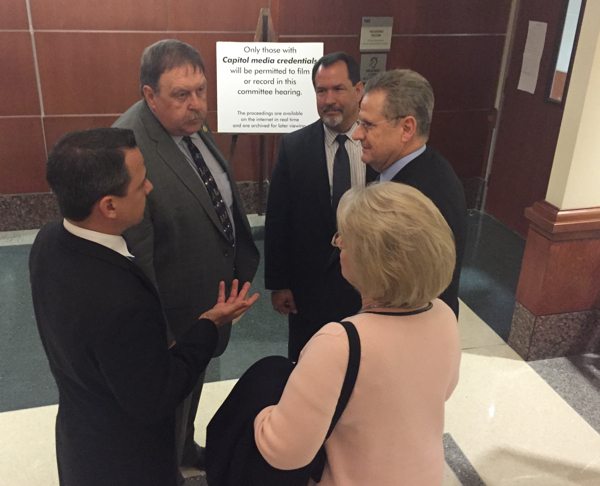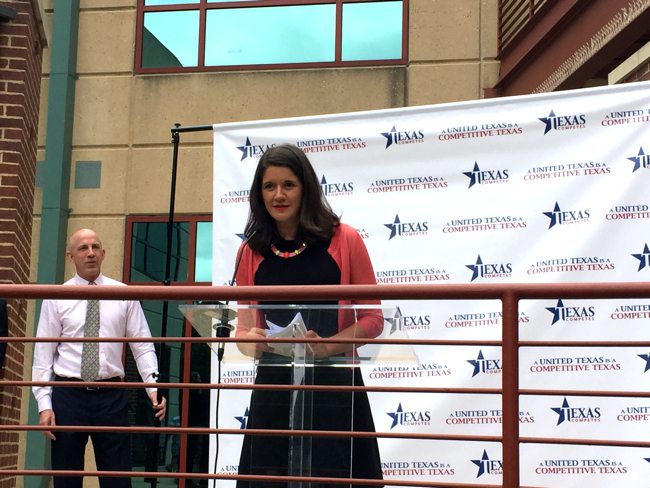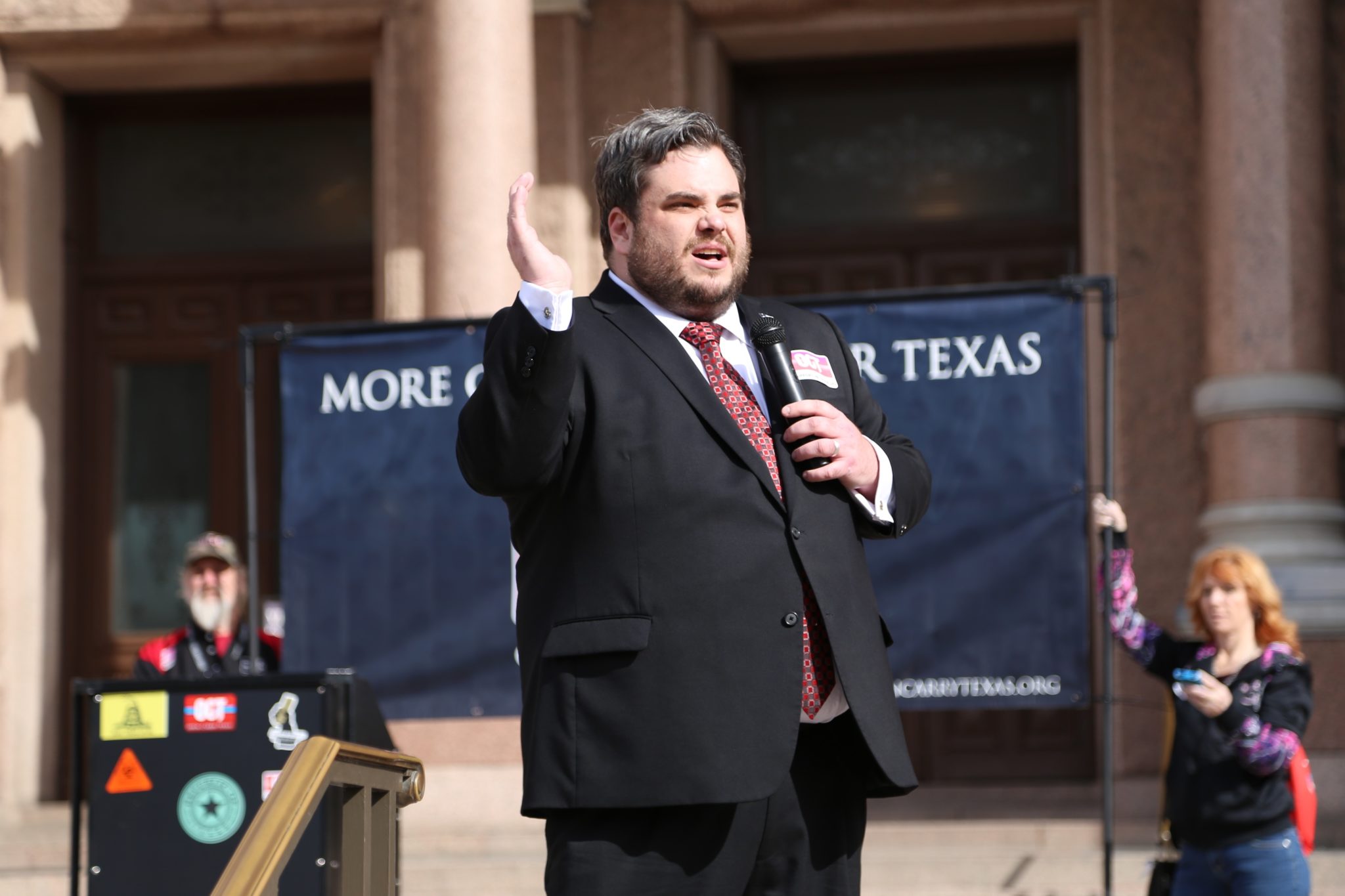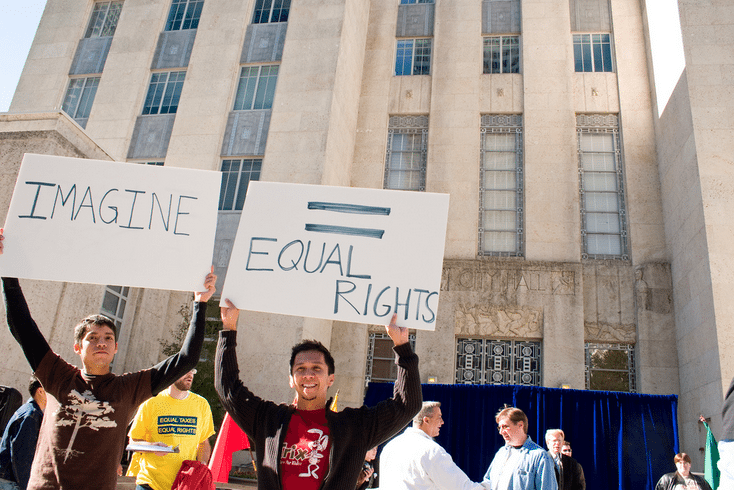
Anti-Gay Marriage Bill Faces ‘Critical Showdown’ In House

Above: Texas Values President Jonathan Saenz, clockwise from left, Rep. Cecil Bell, Texas Pastor Council Executive Director Dave Welch, Rep. Rick Miller and his wife, Babs Miller, confer after a committee hearing on House Bill 4105 last month.
The future of the battle over gay marriage in Texas—and possibly in other states—is likely to be determined by the House of Representatives in the next 72 hours, according to LGBT advocates.
House Bill 4105, by Rep. Cecil Bell (R-Magnolia), which is designed to undermine a U.S. Supreme Court ruling in favor of same-sex marriage, is scheduled for a floor vote Tuesday.
Kathy Miller, president of the Texas Freedom Network, said if HB 4105 passes the House, it’s very likely to clear the more conservative Senate before being signed by Republican Gov. Greg Abbott. There were 204 bills ahead of HB 4105 on the House calendar, and the deadline for it to pass the chamber is midnight Thursday.
“This House vote is a critical showdown. If the bill is delayed in coming up, if there are procedural issues with the bill, or if the leadership persuades the bill’s author to take the bill down, then it will not get passed and we will have dodged a bullet,” Miller told reporters during a phone conference Monday morning. “The ball game is really all being played in the Texas House of Representatives in the next 72 hours, and if I had to say, I don’t know what’s going to happen. It’s critical that people speak out.”
HB 4105 is one of more than 20 anti-LGBT bills introduced in the 84th Legislature, believed to be the most in the history of any state. However, with time running out in the session, only four have cleared committee, and of those LGBT advocates view HB 4105 as the most significant threat to equality.
The bill would bar state and local employees from issuing, enforcing or recognizing same-sex marriage licenses—and prohibit public monies from being used to do so—regardless of any court order.
LGBT advocates say if the high court rules in favor of same-sex marriage, HB 4105 would set up a showdown between state and federal law, costing Texas millions of dollars in litigation and potentially delaying the effectiveness of the decision by years. They say the bill would unleash chaos similar to what’s been seen in Alabama over same-sex marriage, and generate the type of business backlash associated with passage of an anti-LGBT religious freedom law in Indiana.
Unless it receives a two-thirds supermajority of 100 votes in the House and 21 in the Senate, HB 4015 wouldn’t take effect until Sept. 1, more than two months after the high court rules in same-sex marriage cases from four other states in late June.
In addition to Bell, HB 4105 is co-authored by 88 other House Republicans. Only nine Republicans hadn’t signed on as co-authors as of Monday morning: Rodney Anderson (Grand Prairie), Sarah Davis (Houston), Craig Goldman (Fort Worth), Todd Hunter (Corpus Christi), Linda Koop (Dallas), Morgan Meyer (Dallas), John Smithee (Amarillo), Speaker Joe Straus (San Antonio) and Jason Villalba (Dallas).
None of the chamber’s 52 Democrats were listed as co-authors.
“There’s a great deal of opposition to this bill too, primarily from Democrats,” Miller said. “I think there is a lot of quiet opposition from moderate Republicans, so I think the supermajority would be much more difficult to achieve.”
Rebecca Robertson, legal and policy director at the ACLU of Texas, said HB 4105 is designed to give Texas another legal basis for challenging same-sex marriage in court: state sovereignty. And she said it could be used as a model by other states for resisting the Supreme Court ruling.
“The last time that we saw similar efforts to undermine court rulings about what the Constitution requires was when Southern states attempted to use the power of the purse to avoid having to comply with federal court orders ordering school desegregation,” Robertson said. “Those tactics were rejected, but obviously it took years of litigation to get to that point. HB 4105 is trying to do the same kind of end run around the Constitution.”
If the bill passes, state and local officials likely would face lawsuits from either side depending on whether they choose to issue or recognize same-sex marriage licenses, Robertson said.
Under the bill, if a county clerk were to issue a marriage license to a same-sex couple, the state would retain $30 from the fee that’s normally returned to counties. The bill would also prohibit the state Vital Statics Unit from recording the license, and require that it be turned over to the attorney general’s office.
Travis County Clerk Dana DeBeauvoir estimated the bill would cost her county $40,000 annually in fees from same-sex marriage licenses. Nevertheless, if the high court rules in favor of marriage equality, her office likely would begin issuing licenses to gay couples shortly thereafter.
Other county clerks said they’re taking a wait-and-see approach but would be reluctant to alter the marriage license application forms.
Attorney General Ken Paxton, who staunchly opposes same-sex marriage, didn’t respond to a request for comment about HB 4105.
Gov. Greg Abbott, who vigorously defended the state’s marriage ban as Paxton’s predecessor, has not said whether he would sign HB 4105.
“Typically, we don’t comment until it’s either passed both chambers or on the way to his desk,” Abbott spokesman Sam Taylor said. “There are rare exceptions.”
One of those exceptions came last week, when Abbott announced support for Senate Bill 2065 and House Bill 3567, which are designed to prevent pastors and churches from being forced to participate in same-sex weddings. The Senate tentatively approved SB 2065 in a 21-10 vote Monday, and the House is scheduled to vote on HB 3567 Tuesday.
LGBT advocates say they’d support SB 2065 and HB 3567 if the proposals are narrowed so they merely mirror existing protections, but the authors have refused to do so.


